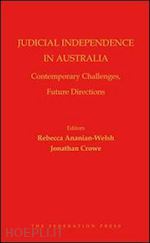
Questo prodotto usufruisce delle SPEDIZIONI GRATIS
selezionando l'opzione Corriere Veloce in fase di ordine.
Pagabile anche con Carta della cultura giovani e del merito, 18App Bonus Cultura e Carta del Docente
Judicial independence is a fundamental aspect of law and governance in Australia, commanding near universal endorsement. Despite its vital importance, the independence of the Australian judiciary is threatened on a variety of fronts. This volume brings together some of Australia’s leading constitutional scholars to discuss judicial independence and its contemporary challenges, including challenges posed by politics, judicial selection, extra-judicial activities, social media and the war on terror. Contributions include theoretical, empirical and comparative perspectives. The book includes an initial essay by former Chief Justice of the High Court of Australia, Sir Anthony Mason AC KBE CBE QC. The volume provides a valuable guide to future directions in law and governance, with an eye to strengthening judicial independence in Australia.
CONTENTS
Acknowledgments
About the Contributors
Table of Cases
Table of Statutes
Introduction
Jonathan Crowe and Rebecca Ananian-Welsh
1. Judicial Independence in Australia: Contemporary Challenges, Future Directions
The Hon Sir Anthony Mason
PART I: CONCEPTUALISING JUDICIAL INDEPENDENCE
2. The Two Theses of the Philosophy of Separating Powers: Who Exercises Power and How?
Suri Ratnapala
3. Human, All Too Human: Human Fallibility and the Separation of Powers
Jonathan Crowe
4. The Advancement of Judicial Independence as a Universal Value: A Comparative Perspective
HP Lee
PART II: JUDICIAL APPOINTMENTS AND TENURE
5. Is Talk of the Quality of Judging Sometimes Strained, Feigned or not Sustained?
James Allan
6. Practice and Persuasion: Women, Feminism and Judicial Diversity
Heather Douglas and Francesca Bartlett
7. Judicial Exits: The Tenure of Judges in Three Apex Courts
Brian Opeskin
PART III: INSTITUTIONAL INTEGRITY
8. Comparative Constitutional Law and the Kable Doctrine
Rosalind Dixon and Melissa Vogt
9. Constitutional Silences and Institutional Integrity
Constance Youngwon Lee
10. Institutional Costs of Judicial Independence
Gabrielle Appleby
PART IV: JUDICIAL REASONING AND RHETORIC
11. Keep Your Distance: Independence, Individualism and Decision-Making on Multi-Member Courts
Andrew Lynch
12. The Judicial Scholar and the Scholarly Judge: Extra-Curial Writing and Intellectual Independence on the High Court
David Tomkins and Katherine Lindsay
PART V: EXTRA-JUDICIAL ACTIVITIES
13. Extra-Judicial Activities and Judicial Independence
The Hon Justice Martin Daubney
14. State Judges as Lieutenant-Governors
Rebecca Ananian-Welsh and George Williams
PART VI: COURTS IN SOCIAL CONTEXT
15. Of ‘Fragile Bastions’, ‘Political Judges’ and ‘Robust Debates’: Judges and Their Critics
John M Williams
16. Social Media and the Judiciary: A Challenge to Judicial Independence?
Alysia Blackham and George Williams
17. Judicial Independence in an Age of Terror
Rebecca Ananian-Welsh
Index
Simon Rice OAM
Simon is a Professor of Law at the Australian National University, where he is Director of Law Reform and Social Justice. He researches and writes in discrimination, human rights, access to justice and public interest lawyering.
From 1996-2011 he was a part-time judicial member of the NSW Administrative Decisions Tribunal in the Equal Opportunity Division. He is a past President of Australian Lawyers for Human Rights, and a former Director of the NSW Law Foundation.
In 2002 he was awarded a Medal in the Order of Australia for legal services to the socially and economically disadvantaged
Andrew Day
Professor Andrew Day is a clinical and forensic psychologist who has worked in correctional and forensic mental health services in the UK and Australia. He is a Professor in the School of Psychology, and an Associate Director of the Centre for Mental Health and Wellbeing at Deakin University.
Dr Day obtained his Doctorate in Clinical Psychology at the University of Birmingham UK in 1994 and Masters in Science in Applied Criminological Psychology at the University of London UK in 1991 that included work as a Prison Psychologist with the UK Home Office.
He has published many research articles on offender rehabilitation, co-edited textbooks for pre-university Psychology curriculums, and presented conference papers at national and international research conferences. His current research interests focus mainly on the development of therapeutic and rehabilitative approaches for offenders.











Il sito utilizza cookie ed altri strumenti di tracciamento che raccolgono informazioni dal dispositivo dell’utente. Oltre ai cookie tecnici ed analitici aggregati, strettamente necessari per il funzionamento di questo sito web, previo consenso dell’utente possono essere installati cookie di profilazione e marketing e cookie dei social media. Cliccando su “Accetto tutti i cookie” saranno attivate tutte le categorie di cookie. Per accettare solo deterninate categorie di cookie, cliccare invece su “Impostazioni cookie”. Chiudendo il banner o continuando a navigare saranno installati solo cookie tecnici. Per maggiori dettagli, consultare la Cookie Policy.